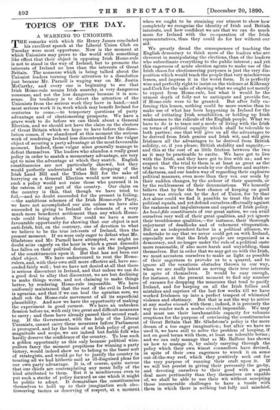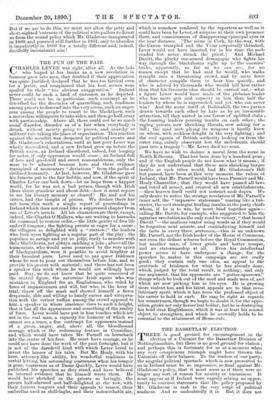TOPICS OF THE DAY.
A WARNING TO UNIONISTS. THE remarks with which Sir Henry James concluded his excellent speech at the Liberal Union Club on Tuesday were most opportune. Now is the moment at which Unionists may prove to the world with something like effect that their object in opposing Irish Home-rule is not to stand in the way of Ireland, but to promote the interests of Ireland no less than the interests of Great Britain. The nonsense which is being talked about the Unionist leaders turning their attention to a dissolution just because Mr. Parnell is waging war on Mr. Justin McCarthy, and every one is beginning to see that Irish Home-rule means Irish anarchy, is very dangerous nonsense, and not the less dangerous because it is non- sense. Its tendency is to divert the attention of the Unionists from the serious work they have in hand,—and most serious work it is, work which may benefit Ireland for centuries to come,—to temporary questions of party advantage and of electioneering prospects. We have a grave work to do before we can think about a General Election, and we should not have the claim on the electors of Great Britain which we hope to have before the disso- lution comes, if we abandoned at this moment the serious work of rendering Ireland less discontented for the vulgar object of securing a party advantage at the most favourable moment. Indeed, these vulgar aims generally manage to defeat themselves. The leaders who abandon a really great policy in order to snatch a momentary advantage, are very apt to miss the advantage at which they snatch. English constituencies are not particularly shrewd, but they would perfectly understand what the dropping of the Irish Land Bill and the Tithes Bill for the sake of hurrying on a General Election would now mean ; and such a policy would not raise those who pursued it in the esteem of any part of the country. Our claim on the country is this, that though we have tried to foil,---and no doubt succeeded for the present in foiling, —the ambitious schemes of the Irish Home-rule Party, we have not accomplished our aim unless we have also succeeded in giving to Ireland the elements of a very much more beneficent settlement than any which Home- rule could bring about. Nor could we have a more favourable opportunity for showing that our object is not anti-Irish, but, on the contrary, one of devotion to what we believe to be the true interests of Ireland, than the present moment. If we were only eager to defeat what Mr. Gladstone and Mr. Parnell have attempted, we might no doubt seize eagerly on the hour in which a great discredit has fallen on their political design, to ask the judgment of the constituencies upon it. But that has not been our chief object. We have endeavoured to rout the Home- rulers, and, with their own still more effective aid, have suc- ceeded fairly well ; but we have not denied at all that there is serious discontent in Ireland, and that unless we can do a good deal to allay that discontent, we are but declining to make things worse, and not claiming to make things better, by rendering Home-rule impossible. We have uniformly maintained that the root of the evil in Ireland is agrarian, and that if we can heal the agrarian sore, we shall rob the Home-rule movement of all its superficial plausibility. And now we have the opportunity of making the experiment in good earnest. We have an unbroken Session before us, with only two great and difficult measures to carry ; and these have already passed their second read- ing. If the Government, with the help of the Liberal Unionists, cannot carry these measures before Parliament is prorogued, and lay the basis of an Irish policy of great magnitude and scope, we are indeed but feeble folk who hardly deserve the confidence of the country. To lose such a golden opportunity as this only because political wire- pullers fancy the moment propitious for winning a party victory, would indeed show us to belong to the baser sort of strategists, and would go far to justify the country in treating all we had hitherto said as ill-disguised pleas for our own party advantage. It is, of course, quite untrue that our chiefs are contemplating any mean folly of the kind attributed to them. But it is mischievous even to put such a stroke of policy forward as one which it might be politic to adopt. It demoralises the constituencies themselves to hold up to their imagination such ele- tioneering tactics as deserving gf respect; at a moment when we ought to be straining our utmost to show how completely we recognise the identity of Irish and British interests, and how confident we are that we can do much more for Ireland with the co-operation of the Irish representatives, than they could do for her without our aid.
We greatly dread the consequences of teaching the English democracy to think more of the leaders who are cleverest in manipulating the elections, than of the leaders who subordinate everything to the public interest ; and yet this eagerness of acute election agents to make use of the Irish chaos for electioneering purposes is just the very dis- position which would teach the people that very mischievous lesson, and impress it in the worst form. It is perfectly wise and perfectly right to insist on the violence at Kilkenny and Cork for the sake of showing what we ought not merely to expect from Home-rule, but what it would be the utmost depth of folly not to anticipate and provide for, if Home-rule were to be granted. But after fully en- forcing this lesson, nothing could be more unwise than to make use of what has been happening in Ireland for the sake of irritating Irish sensibilities, or holding up Irish weaknesses to the ridicule of the English people. What we have to do is to trace out a mode of living with the Irish on terms of political equality which shall be tolerable to both parties ; one that will give us all the advantages to be derived from Irish genius and Irish wit, and will give Irishmen all the advantages to be derived from British solidity, or, if you please, British stolidity and sagacity,— and this at the cost of as little friction between the two as it may be practicable to excite. We have got to live with the Irish, and they have got to live with us ; and we suspect that the trial to them is at least as great as the trial to us. We vex their souls by our dullness and matter- of-factness, and our leaden way of regarding their explosive political manners, even more than they vex our souls by their sudden changes, by the ardour of their quarrels, or by the recklessness of their denunciations. We honestly' believe that by far the best chance of keeping on good terms was struck out by the Act of Union, for by that Act alone could we find it possible to treat the Irish as political equals, and yet defend ourselves effectually against the rashness and impulsiveness and caprice of Irish policy. As bond-fide constituents of our great nation, we can avail ourselves very well of their great qualities, and yet ignore their troublesome qualities,—for instance, their thorough enjoyment of deadlocks and of vehement vituperation. But as an independent factor in a political alliance, we undertake to say that we never could get on with Ireland, especially now that the Irish people are organised as a democracy, and no longer under the rule of a political caste more reasonable, if also more harsh and unyielding, than themselves. But in order that we may get on with the Irish, we must accustom ourselves to make as light as possible of their eagerness to provoke us to a quarrel, and to. ignore all the vexatious obstacles thrown in our way, when we are really intent on serving their true interests in spite of themselves. It would be easy enough, for instance, at the present moment to find any number of excuses for dropping the measures that tend to pacify Ireland, and for harping on all the Irish follies and mistakes and caprices of the last few weeks till we have worked Irishmen up into a perfect tempest of whimsical violence and obstinacy. But that is not the way to arrive at any modus vivendi with them ; indeed, it is precisely the way to render such a modus vivendi impossible. We may and must use their inexhaustible capacity for volcanic eruptions for the purpose of convincing the constituencies of Great Britain that Mr. Gladstone's policy is the mere dream of a too eager imagination; but after we have so. used it, we have still to solve the problem of keeping, if not on good terms with them, at least on tolerable terms ; and we can only manage that as Mr. Balfour has shown us how to manage it, by calmly carrying through the policy which their own wisest counsellors have devised, in spite of their own eagerness to wreck it on some out-of-the-way reef, which they positively seek out for the very purpose of running their craft upon it. If we will but persist in giving their perversity the go-by, and devoting ourselves to their good with a great deal more pertinacity than they themselves are capable of, we shall be able to use their wit without accepting those innumerable challenges to have a tussle with them in which there is nothing but folly and mischief, But if we are to do this, we must not allow the petty and short-sighted 'cuteness of the political wire-pullers to divert us from the sound policy which Mr. Gladstone inaugurated in 1869, and pursued still further in 1881, only to abandon it impatiently in 1886 for a totally different and, indeed, decidedly inconsistent aim !











































 Previous page
Previous page